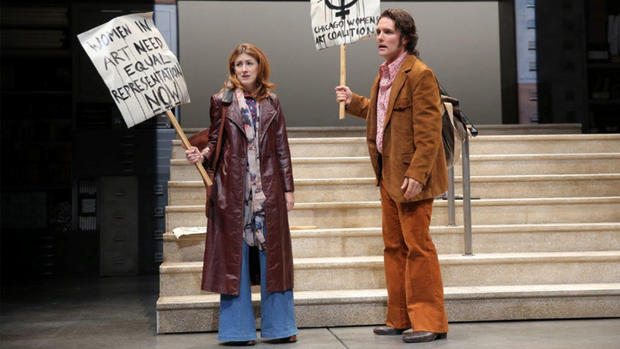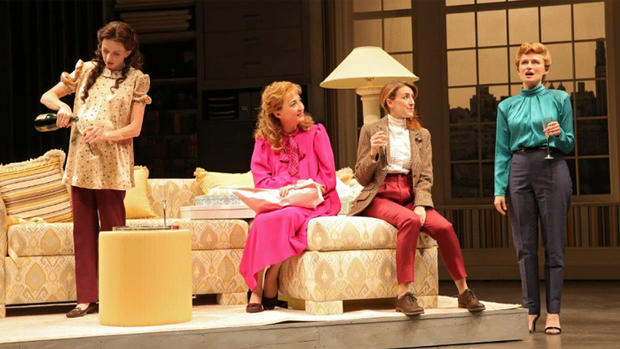Curiocity: Q&A With 'The Heidi Chronicles' Star
A Pulitzer Prize-winning play, now featured at the Guthrie Theater, tells the story of a determined young woman living through societal change and the evolution of women's rights. The story follows Heidi Holland through her high school days in the 60s to her career-focused life of the 80s -- all the while painting a backdrop of momentous events that shaped the country.
Kate Wetherhead leads the cast in this coming of age tale that asks the ever-present, and yes, at times obnoxious, question "Can women have it all?"
Wetherhead was kind enough to chat with us after an appearance on WCCO 4 News at Noon to discuss everything from the evolution of the word, "feminist" to playing a role that spans several decades.
-------
Tell us a little about the character you play, Heidi Holland.
Heidi Holland is, I think, a hyper-intelligent, observant, insightful, ambitious, conflicted woman. And she comes of age during a turbulent political time, which awakens in her this feminist side of herself and a desire to change the way society thinks about women and also, you know, sort of determines her own path with this awareness of women's equality. Along the way, she becomes sort of disenchanted with how the women's movement evolves and I think for her, her expectations of it aren't quite met. And while women do make incredible strides and amazing progress, there's a sense of community and sort of the united quality that was there at the start of the women's movement in the 60s, that fades. And I think that's quite a disappointment for her. It's hard for her to reconcile that.
That being said, she's incredibly funny. She's very witty and clever and she has these very meaningful friendships and relationships with both men and women who sort inform her development as well. But I think she is representative of a lot of women at that time who mature with a certain set of expectations and then kind of have to manage the fall out of how they're met and how they're not met.
The idea of feminism is still widely discussed today. People still struggle with how to define it. So it seems a play like this is highly relevant, even though it takes place decades ago.
It's incredibly relevant now. As you said, in a unique way because for all the progress that's been made, you know, the more you color in one section of a painting, the more the uncolored part suddenly looks very stark and sort of unanswered. I think people watching this play walk away from it understanding that the conversation absolutely needs to continue. Because we're still wrestling with inequality and we're still wrestling with stereotypes, definitions of women that need to be challenged.
The play has kind of been given the task of answering the question, "Can women have it all?" But what do you think about that question in general?
I think it's like a riddle. First of all, what does "all" mean? All meant something very different in 1975 than it did in 1989 than it does in 2014. And no one can have it all. Men can't have it all, women can't have it all. Life is about making compromises. And yet, for women specifically, I think the question is just more difficult to answer as long as women are reproductive. The question of motherhood is just specific to women -- we're the only ones who can do that. And the sacrifice that's required physically, professionally, emotionally, all of that, I think, will continue to be at the heart of the discussion. That's my personal opinion.
Obviously the play goes through several decades and in order to get the audience to come along with you, you get to span several different fashion choices and styles. What was that like for you?
Well it's really fun. Even though I'm playing the same character, I get to have all these transformations through fashion and through hairstyles. And also, the play's basically a series of snapshots of America at these critical moments in our history, whether it be Nixon's resignation or the assassination of John Lennon, or the AIDS crisis. These are embedded in our memories as being really transformative events in our history. It's been a great history lesson for us, and then to try and inhabit that as these characters, as these very vivid, well-drawn characters has been really, really great. And then just artificially, just wearing those costumes and wearing the hairstyles is just fun. It's like Halloween every seven minutes.
Lastly, what do you hope people take away from this show? What kinds of conversations do you hope they have leaving the theater?
A few things – I hope they appreciate how brave Wendy Wassestein was to write this play when she did. Because a lot of what's in the play, certainly some of the social issues we take for granted now, but when she was writing them, they were very sensitive subjects – particularly with homosexuality or being a single parent. And the fact that she was able to depict those issues with such humor and grace at that time was remarkable. And I hope people explore their own lives and see what they have in common with Heidi, what they don't have in common, what they agree with her, what they don't agree with her and then explore the reasons why. I think it's just a really thought-provoking piece that is, at the same time, highly entertaining. Often you don't get both at the same time but I think this provides both laughs and heart.
For more information or to buy tickets to the show, click here.





